Analyzing Equality and Participation Issues in the Tourism Sector
VerifiedAdded on 2023/06/05
|8
|2260
|295
Essay
AI Summary
This essay provides a comprehensive overview of the tourism industry, tracing its origins and evolution while highlighting critical issues related to equality, access, and participation. It examines the historical context, including the emergence of the 'Grand Tour' and the impact of the industrial revolution, alongside statistical data illustrating the industry's economic contributions and setbacks, such as the COVID-19 pandemic. The essay delves into emerging markets like sustainable and food tourism, and the experience economy, further addressing challenges like gender pay gaps, unemployment, and ethical considerations, ultimately emphasizing the need for sustainable and morally sound practices within the tourism sector. It references various books and journals to support its analysis, providing a well-rounded perspective on the past, present, and future of the tourism industry.
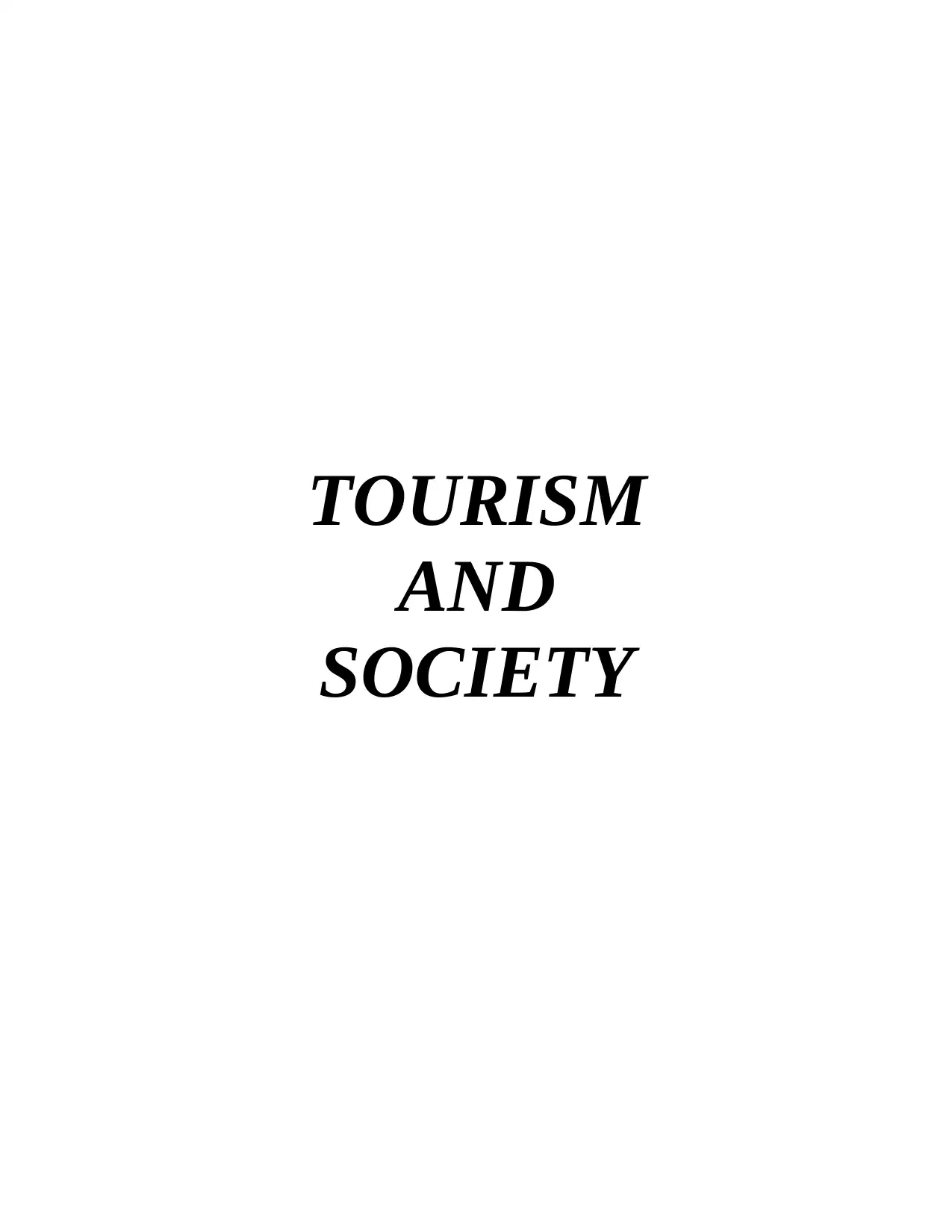
TOURISM
AND
SOCIETY
AND
SOCIETY
Paraphrase This Document
Need a fresh take? Get an instant paraphrase of this document with our AI Paraphraser
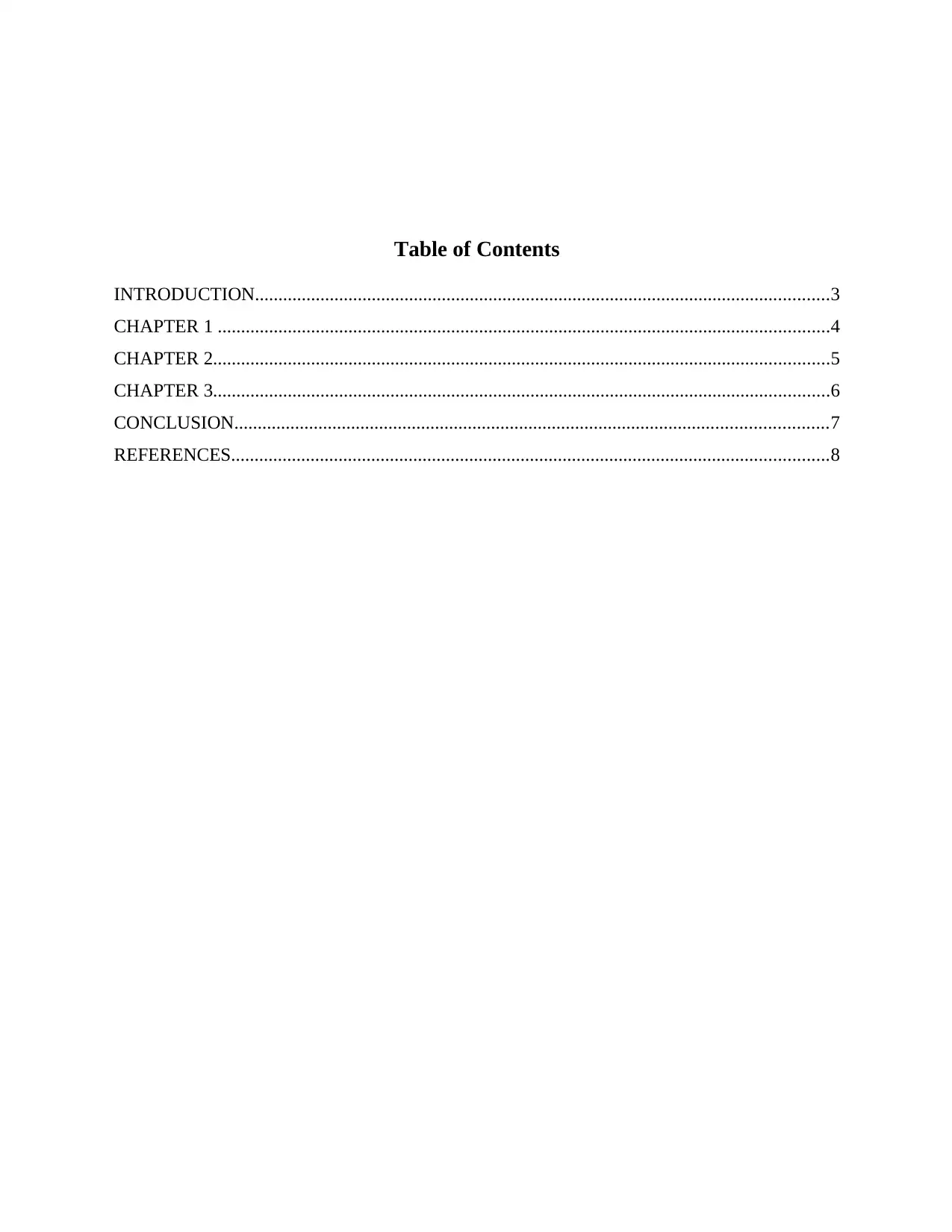
Table of Contents
INTRODUCTION...........................................................................................................................3
CHAPTER 1 ...................................................................................................................................4
CHAPTER 2....................................................................................................................................5
CHAPTER 3....................................................................................................................................6
CONCLUSION...............................................................................................................................7
REFERENCES................................................................................................................................8
INTRODUCTION...........................................................................................................................3
CHAPTER 1 ...................................................................................................................................4
CHAPTER 2....................................................................................................................................5
CHAPTER 3....................................................................................................................................6
CONCLUSION...............................................................................................................................7
REFERENCES................................................................................................................................8
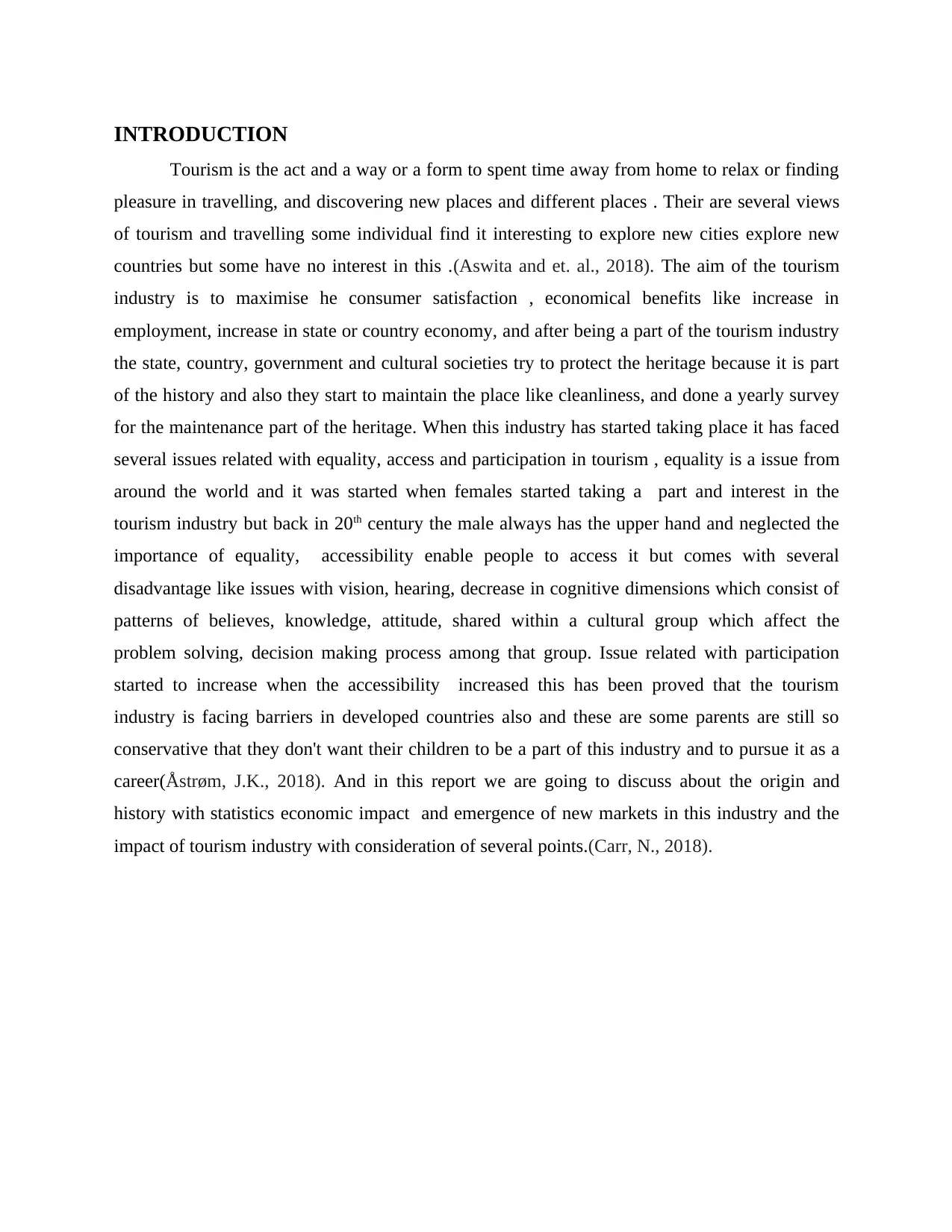
INTRODUCTION
Tourism is the act and a way or a form to spent time away from home to relax or finding
pleasure in travelling, and discovering new places and different places . Their are several views
of tourism and travelling some individual find it interesting to explore new cities explore new
countries but some have no interest in this .(Aswita and et. al., 2018). The aim of the tourism
industry is to maximise he consumer satisfaction , economical benefits like increase in
employment, increase in state or country economy, and after being a part of the tourism industry
the state, country, government and cultural societies try to protect the heritage because it is part
of the history and also they start to maintain the place like cleanliness, and done a yearly survey
for the maintenance part of the heritage. When this industry has started taking place it has faced
several issues related with equality, access and participation in tourism , equality is a issue from
around the world and it was started when females started taking a part and interest in the
tourism industry but back in 20th century the male always has the upper hand and neglected the
importance of equality, accessibility enable people to access it but comes with several
disadvantage like issues with vision, hearing, decrease in cognitive dimensions which consist of
patterns of believes, knowledge, attitude, shared within a cultural group which affect the
problem solving, decision making process among that group. Issue related with participation
started to increase when the accessibility increased this has been proved that the tourism
industry is facing barriers in developed countries also and these are some parents are still so
conservative that they don't want their children to be a part of this industry and to pursue it as a
career(Åstrøm, J.K., 2018). And in this report we are going to discuss about the origin and
history with statistics economic impact and emergence of new markets in this industry and the
impact of tourism industry with consideration of several points.(Carr, N., 2018).
Tourism is the act and a way or a form to spent time away from home to relax or finding
pleasure in travelling, and discovering new places and different places . Their are several views
of tourism and travelling some individual find it interesting to explore new cities explore new
countries but some have no interest in this .(Aswita and et. al., 2018). The aim of the tourism
industry is to maximise he consumer satisfaction , economical benefits like increase in
employment, increase in state or country economy, and after being a part of the tourism industry
the state, country, government and cultural societies try to protect the heritage because it is part
of the history and also they start to maintain the place like cleanliness, and done a yearly survey
for the maintenance part of the heritage. When this industry has started taking place it has faced
several issues related with equality, access and participation in tourism , equality is a issue from
around the world and it was started when females started taking a part and interest in the
tourism industry but back in 20th century the male always has the upper hand and neglected the
importance of equality, accessibility enable people to access it but comes with several
disadvantage like issues with vision, hearing, decrease in cognitive dimensions which consist of
patterns of believes, knowledge, attitude, shared within a cultural group which affect the
problem solving, decision making process among that group. Issue related with participation
started to increase when the accessibility increased this has been proved that the tourism
industry is facing barriers in developed countries also and these are some parents are still so
conservative that they don't want their children to be a part of this industry and to pursue it as a
career(Åstrøm, J.K., 2018). And in this report we are going to discuss about the origin and
history with statistics economic impact and emergence of new markets in this industry and the
impact of tourism industry with consideration of several points.(Carr, N., 2018).
⊘ This is a preview!⊘
Do you want full access?
Subscribe today to unlock all pages.

Trusted by 1+ million students worldwide
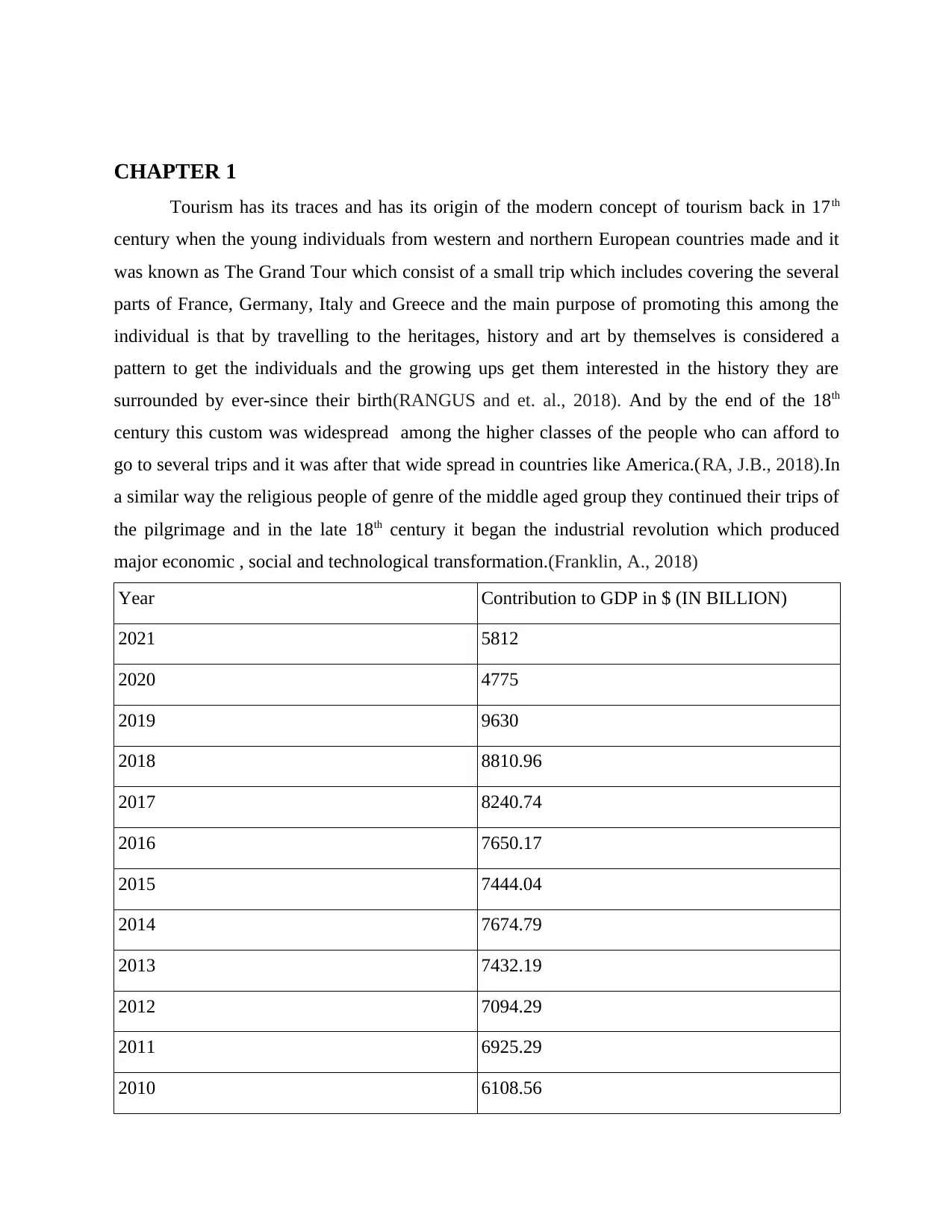
CHAPTER 1
Tourism has its traces and has its origin of the modern concept of tourism back in 17th
century when the young individuals from western and northern European countries made and it
was known as The Grand Tour which consist of a small trip which includes covering the several
parts of France, Germany, Italy and Greece and the main purpose of promoting this among the
individual is that by travelling to the heritages, history and art by themselves is considered a
pattern to get the individuals and the growing ups get them interested in the history they are
surrounded by ever-since their birth(RANGUS and et. al., 2018). And by the end of the 18th
century this custom was widespread among the higher classes of the people who can afford to
go to several trips and it was after that wide spread in countries like America.(RA, J.B., 2018).In
a similar way the religious people of genre of the middle aged group they continued their trips of
the pilgrimage and in the late 18th century it began the industrial revolution which produced
major economic , social and technological transformation.(Franklin, A., 2018)
Year Contribution to GDP in $ (IN BILLION)
2021 5812
2020 4775
2019 9630
2018 8810.96
2017 8240.74
2016 7650.17
2015 7444.04
2014 7674.79
2013 7432.19
2012 7094.29
2011 6925.29
2010 6108.56
Tourism has its traces and has its origin of the modern concept of tourism back in 17th
century when the young individuals from western and northern European countries made and it
was known as The Grand Tour which consist of a small trip which includes covering the several
parts of France, Germany, Italy and Greece and the main purpose of promoting this among the
individual is that by travelling to the heritages, history and art by themselves is considered a
pattern to get the individuals and the growing ups get them interested in the history they are
surrounded by ever-since their birth(RANGUS and et. al., 2018). And by the end of the 18th
century this custom was widespread among the higher classes of the people who can afford to
go to several trips and it was after that wide spread in countries like America.(RA, J.B., 2018).In
a similar way the religious people of genre of the middle aged group they continued their trips of
the pilgrimage and in the late 18th century it began the industrial revolution which produced
major economic , social and technological transformation.(Franklin, A., 2018)
Year Contribution to GDP in $ (IN BILLION)
2021 5812
2020 4775
2019 9630
2018 8810.96
2017 8240.74
2016 7650.17
2015 7444.04
2014 7674.79
2013 7432.19
2012 7094.29
2011 6925.29
2010 6108.56
Paraphrase This Document
Need a fresh take? Get an instant paraphrase of this document with our AI Paraphraser
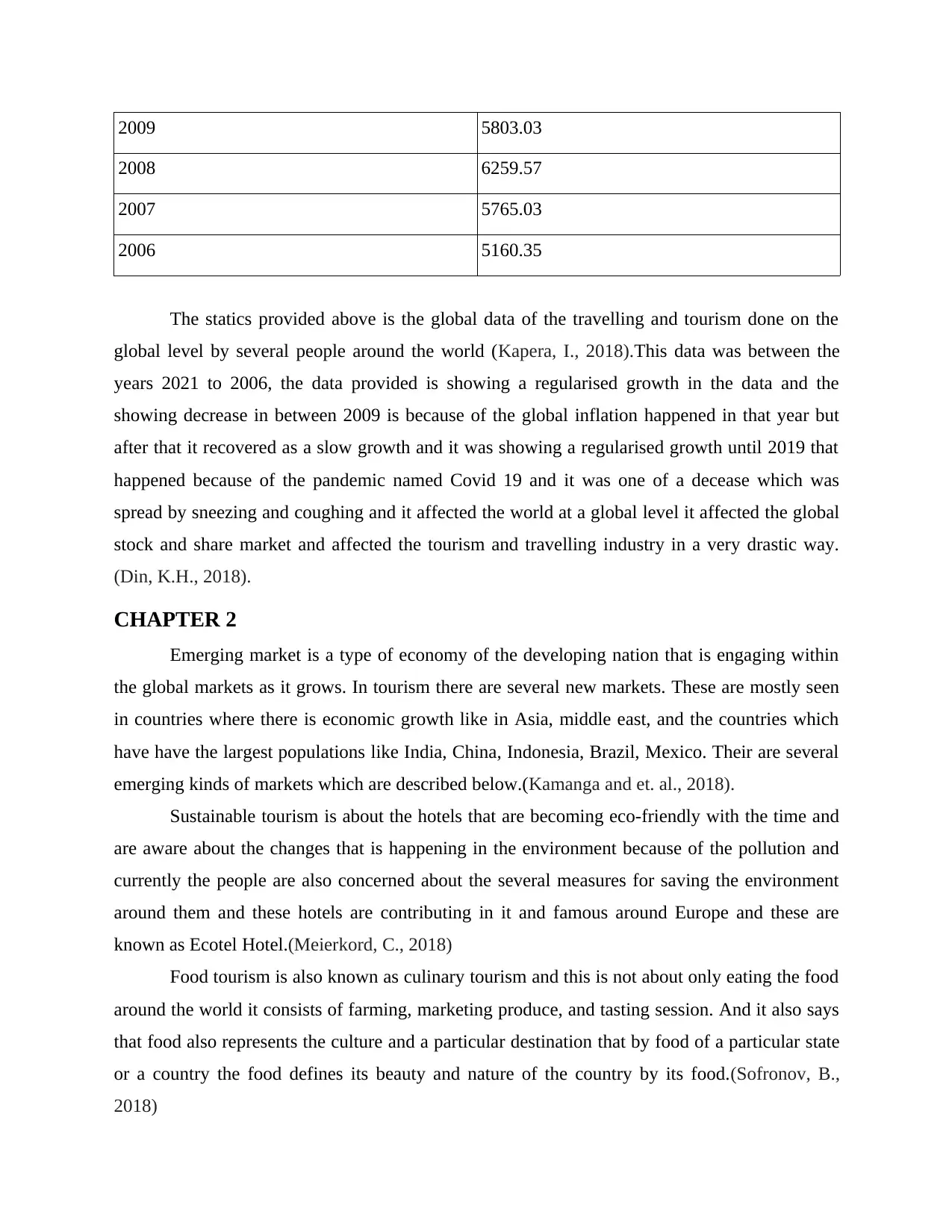
2009 5803.03
2008 6259.57
2007 5765.03
2006 5160.35
The statics provided above is the global data of the travelling and tourism done on the
global level by several people around the world (Kapera, I., 2018).This data was between the
years 2021 to 2006, the data provided is showing a regularised growth in the data and the
showing decrease in between 2009 is because of the global inflation happened in that year but
after that it recovered as a slow growth and it was showing a regularised growth until 2019 that
happened because of the pandemic named Covid 19 and it was one of a decease which was
spread by sneezing and coughing and it affected the world at a global level it affected the global
stock and share market and affected the tourism and travelling industry in a very drastic way.
(Din, K.H., 2018).
CHAPTER 2
Emerging market is a type of economy of the developing nation that is engaging within
the global markets as it grows. In tourism there are several new markets. These are mostly seen
in countries where there is economic growth like in Asia, middle east, and the countries which
have have the largest populations like India, China, Indonesia, Brazil, Mexico. Their are several
emerging kinds of markets which are described below.(Kamanga and et. al., 2018).
Sustainable tourism is about the hotels that are becoming eco-friendly with the time and
are aware about the changes that is happening in the environment because of the pollution and
currently the people are also concerned about the several measures for saving the environment
around them and these hotels are contributing in it and famous around Europe and these are
known as Ecotel Hotel.(Meierkord, C., 2018)
Food tourism is also known as culinary tourism and this is not about only eating the food
around the world it consists of farming, marketing produce, and tasting session. And it also says
that food also represents the culture and a particular destination that by food of a particular state
or a country the food defines its beauty and nature of the country by its food.(Sofronov, B.,
2018)
2008 6259.57
2007 5765.03
2006 5160.35
The statics provided above is the global data of the travelling and tourism done on the
global level by several people around the world (Kapera, I., 2018).This data was between the
years 2021 to 2006, the data provided is showing a regularised growth in the data and the
showing decrease in between 2009 is because of the global inflation happened in that year but
after that it recovered as a slow growth and it was showing a regularised growth until 2019 that
happened because of the pandemic named Covid 19 and it was one of a decease which was
spread by sneezing and coughing and it affected the world at a global level it affected the global
stock and share market and affected the tourism and travelling industry in a very drastic way.
(Din, K.H., 2018).
CHAPTER 2
Emerging market is a type of economy of the developing nation that is engaging within
the global markets as it grows. In tourism there are several new markets. These are mostly seen
in countries where there is economic growth like in Asia, middle east, and the countries which
have have the largest populations like India, China, Indonesia, Brazil, Mexico. Their are several
emerging kinds of markets which are described below.(Kamanga and et. al., 2018).
Sustainable tourism is about the hotels that are becoming eco-friendly with the time and
are aware about the changes that is happening in the environment because of the pollution and
currently the people are also concerned about the several measures for saving the environment
around them and these hotels are contributing in it and famous around Europe and these are
known as Ecotel Hotel.(Meierkord, C., 2018)
Food tourism is also known as culinary tourism and this is not about only eating the food
around the world it consists of farming, marketing produce, and tasting session. And it also says
that food also represents the culture and a particular destination that by food of a particular state
or a country the food defines its beauty and nature of the country by its food.(Sofronov, B.,
2018)
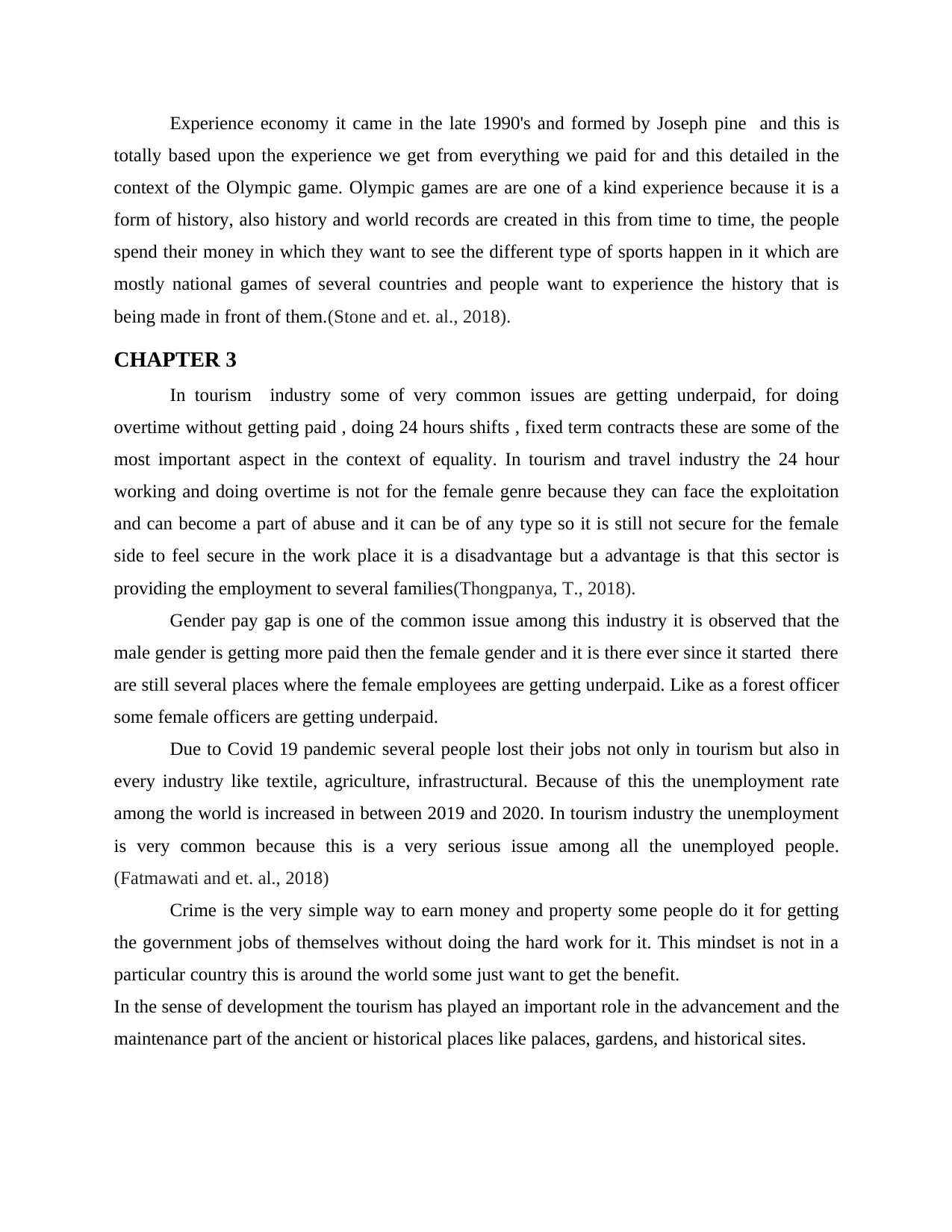
Experience economy it came in the late 1990's and formed by Joseph pine and this is
totally based upon the experience we get from everything we paid for and this detailed in the
context of the Olympic game. Olympic games are are one of a kind experience because it is a
form of history, also history and world records are created in this from time to time, the people
spend their money in which they want to see the different type of sports happen in it which are
mostly national games of several countries and people want to experience the history that is
being made in front of them.(Stone and et. al., 2018).
CHAPTER 3
In tourism industry some of very common issues are getting underpaid, for doing
overtime without getting paid , doing 24 hours shifts , fixed term contracts these are some of the
most important aspect in the context of equality. In tourism and travel industry the 24 hour
working and doing overtime is not for the female genre because they can face the exploitation
and can become a part of abuse and it can be of any type so it is still not secure for the female
side to feel secure in the work place it is a disadvantage but a advantage is that this sector is
providing the employment to several families(Thongpanya, T., 2018).
Gender pay gap is one of the common issue among this industry it is observed that the
male gender is getting more paid then the female gender and it is there ever since it started there
are still several places where the female employees are getting underpaid. Like as a forest officer
some female officers are getting underpaid.
Due to Covid 19 pandemic several people lost their jobs not only in tourism but also in
every industry like textile, agriculture, infrastructural. Because of this the unemployment rate
among the world is increased in between 2019 and 2020. In tourism industry the unemployment
is very common because this is a very serious issue among all the unemployed people.
(Fatmawati and et. al., 2018)
Crime is the very simple way to earn money and property some people do it for getting
the government jobs of themselves without doing the hard work for it. This mindset is not in a
particular country this is around the world some just want to get the benefit.
In the sense of development the tourism has played an important role in the advancement and the
maintenance part of the ancient or historical places like palaces, gardens, and historical sites.
totally based upon the experience we get from everything we paid for and this detailed in the
context of the Olympic game. Olympic games are are one of a kind experience because it is a
form of history, also history and world records are created in this from time to time, the people
spend their money in which they want to see the different type of sports happen in it which are
mostly national games of several countries and people want to experience the history that is
being made in front of them.(Stone and et. al., 2018).
CHAPTER 3
In tourism industry some of very common issues are getting underpaid, for doing
overtime without getting paid , doing 24 hours shifts , fixed term contracts these are some of the
most important aspect in the context of equality. In tourism and travel industry the 24 hour
working and doing overtime is not for the female genre because they can face the exploitation
and can become a part of abuse and it can be of any type so it is still not secure for the female
side to feel secure in the work place it is a disadvantage but a advantage is that this sector is
providing the employment to several families(Thongpanya, T., 2018).
Gender pay gap is one of the common issue among this industry it is observed that the
male gender is getting more paid then the female gender and it is there ever since it started there
are still several places where the female employees are getting underpaid. Like as a forest officer
some female officers are getting underpaid.
Due to Covid 19 pandemic several people lost their jobs not only in tourism but also in
every industry like textile, agriculture, infrastructural. Because of this the unemployment rate
among the world is increased in between 2019 and 2020. In tourism industry the unemployment
is very common because this is a very serious issue among all the unemployed people.
(Fatmawati and et. al., 2018)
Crime is the very simple way to earn money and property some people do it for getting
the government jobs of themselves without doing the hard work for it. This mindset is not in a
particular country this is around the world some just want to get the benefit.
In the sense of development the tourism has played an important role in the advancement and the
maintenance part of the ancient or historical places like palaces, gardens, and historical sites.
⊘ This is a preview!⊘
Do you want full access?
Subscribe today to unlock all pages.

Trusted by 1+ million students worldwide
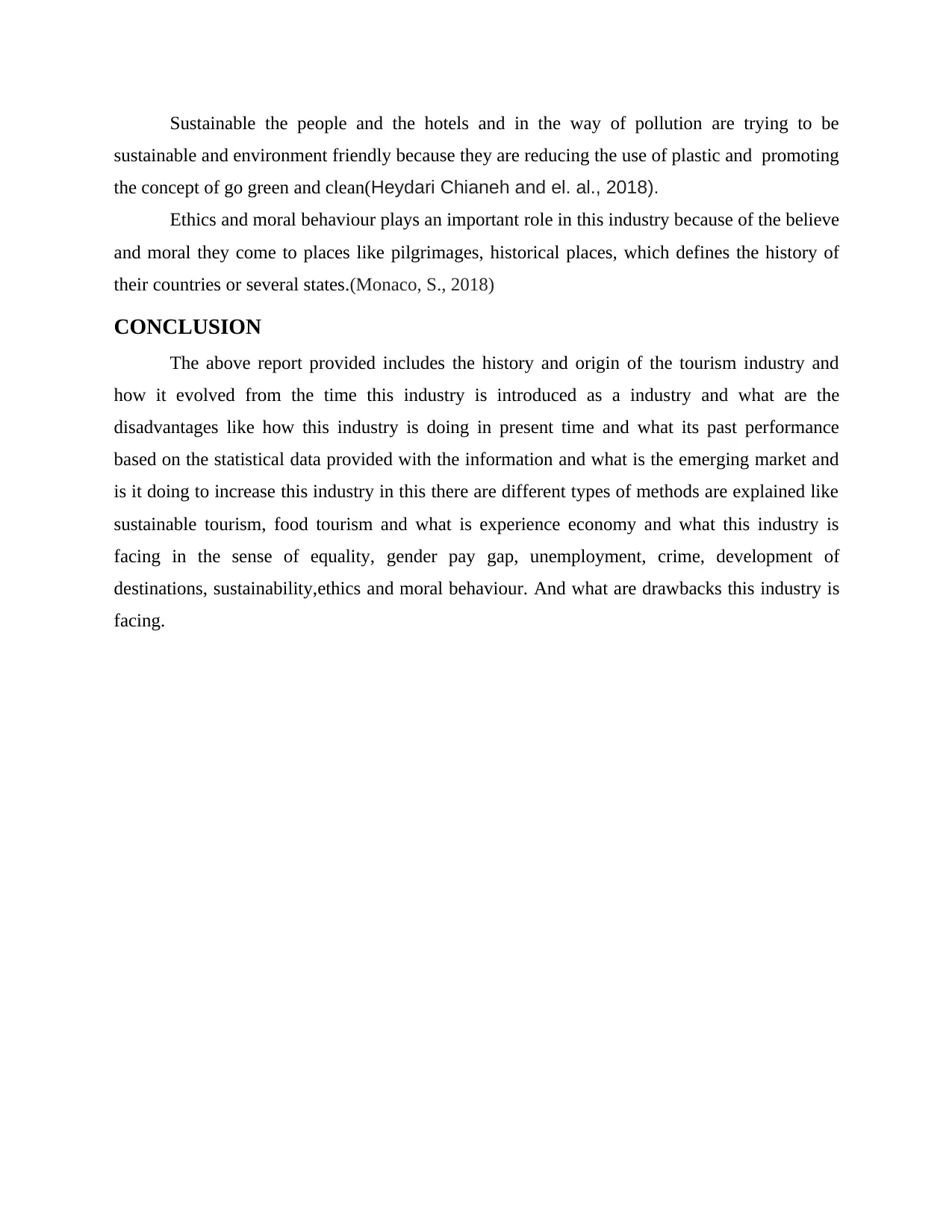
Sustainable the people and the hotels and in the way of pollution are trying to be
sustainable and environment friendly because they are reducing the use of plastic and promoting
the concept of go green and clean(Heydari Chianeh and el. al., 2018).
Ethics and moral behaviour plays an important role in this industry because of the believe
and moral they come to places like pilgrimages, historical places, which defines the history of
their countries or several states.(Monaco, S., 2018)
CONCLUSION
The above report provided includes the history and origin of the tourism industry and
how it evolved from the time this industry is introduced as a industry and what are the
disadvantages like how this industry is doing in present time and what its past performance
based on the statistical data provided with the information and what is the emerging market and
is it doing to increase this industry in this there are different types of methods are explained like
sustainable tourism, food tourism and what is experience economy and what this industry is
facing in the sense of equality, gender pay gap, unemployment, crime, development of
destinations, sustainability,ethics and moral behaviour. And what are drawbacks this industry is
facing.
sustainable and environment friendly because they are reducing the use of plastic and promoting
the concept of go green and clean(Heydari Chianeh and el. al., 2018).
Ethics and moral behaviour plays an important role in this industry because of the believe
and moral they come to places like pilgrimages, historical places, which defines the history of
their countries or several states.(Monaco, S., 2018)
CONCLUSION
The above report provided includes the history and origin of the tourism industry and
how it evolved from the time this industry is introduced as a industry and what are the
disadvantages like how this industry is doing in present time and what its past performance
based on the statistical data provided with the information and what is the emerging market and
is it doing to increase this industry in this there are different types of methods are explained like
sustainable tourism, food tourism and what is experience economy and what this industry is
facing in the sense of equality, gender pay gap, unemployment, crime, development of
destinations, sustainability,ethics and moral behaviour. And what are drawbacks this industry is
facing.
Paraphrase This Document
Need a fresh take? Get an instant paraphrase of this document with our AI Paraphraser
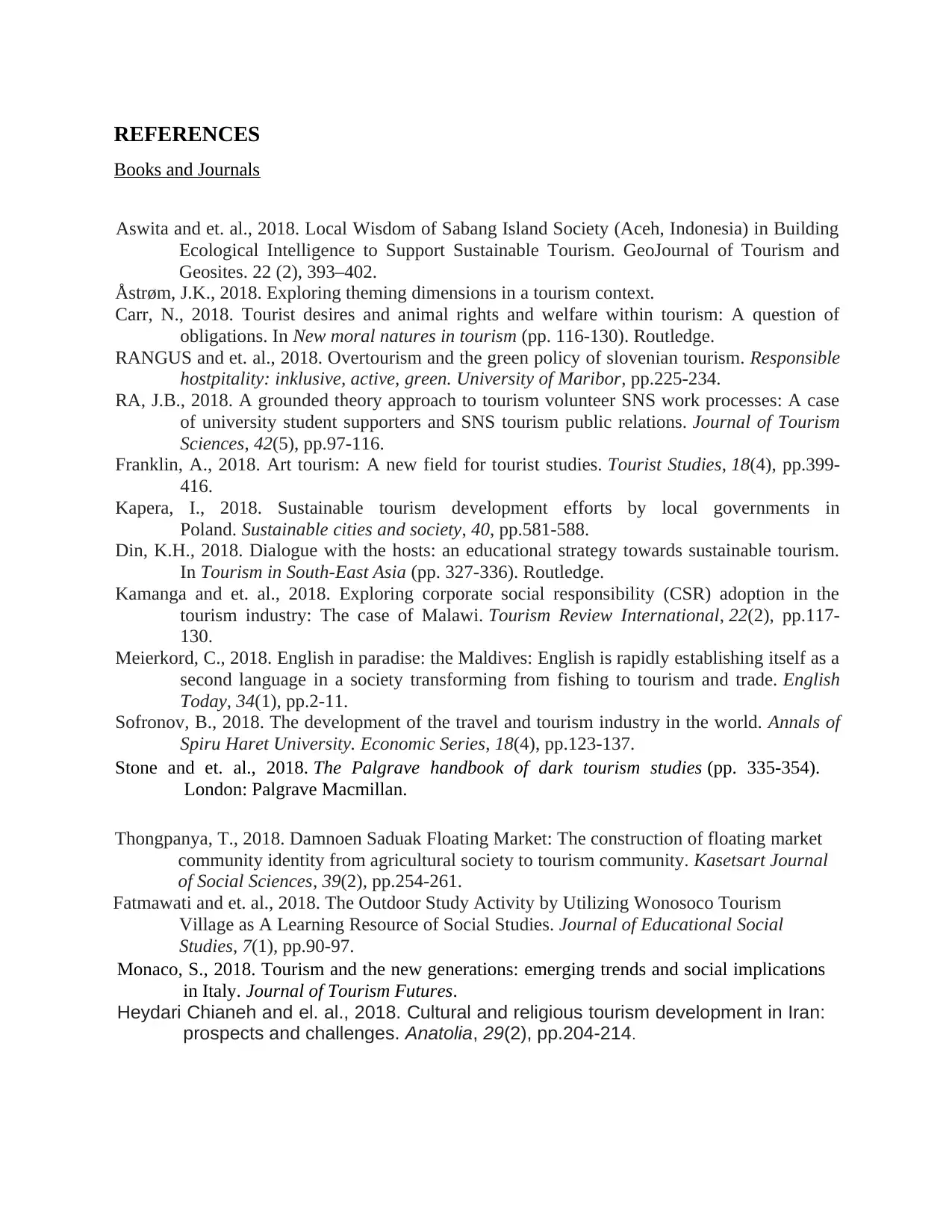
REFERENCES
Books and Journals
Aswita and et. al., 2018. Local Wisdom of Sabang Island Society (Aceh, Indonesia) in Building
Ecological Intelligence to Support Sustainable Tourism. GeoJournal of Tourism and
Geosites. 22 (2), 393–402.
Åstrøm, J.K., 2018. Exploring theming dimensions in a tourism context.
Carr, N., 2018. Tourist desires and animal rights and welfare within tourism: A question of
obligations. In New moral natures in tourism (pp. 116-130). Routledge.
RANGUS and et. al., 2018. Overtourism and the green policy of slovenian tourism. Responsible
hostpitality: inklusive, active, green. University of Maribor, pp.225-234.
RA, J.B., 2018. A grounded theory approach to tourism volunteer SNS work processes: A case
of university student supporters and SNS tourism public relations. Journal of Tourism
Sciences, 42(5), pp.97-116.
Franklin, A., 2018. Art tourism: A new field for tourist studies. Tourist Studies, 18(4), pp.399-
416.
Kapera, I., 2018. Sustainable tourism development efforts by local governments in
Poland. Sustainable cities and society, 40, pp.581-588.
Din, K.H., 2018. Dialogue with the hosts: an educational strategy towards sustainable tourism.
In Tourism in South-East Asia (pp. 327-336). Routledge.
Kamanga and et. al., 2018. Exploring corporate social responsibility (CSR) adoption in the
tourism industry: The case of Malawi. Tourism Review International, 22(2), pp.117-
130.
Meierkord, C., 2018. English in paradise: the Maldives: English is rapidly establishing itself as a
second language in a society transforming from fishing to tourism and trade. English
Today, 34(1), pp.2-11.
Sofronov, B., 2018. The development of the travel and tourism industry in the world. Annals of
Spiru Haret University. Economic Series, 18(4), pp.123-137.
Stone and et. al., 2018. The Palgrave handbook of dark tourism studies (pp. 335-354).
London: Palgrave Macmillan.
Thongpanya, T., 2018. Damnoen Saduak Floating Market: The construction of floating market
community identity from agricultural society to tourism community. Kasetsart Journal
of Social Sciences, 39(2), pp.254-261.
Fatmawati and et. al., 2018. The Outdoor Study Activity by Utilizing Wonosoco Tourism
Village as A Learning Resource of Social Studies. Journal of Educational Social
Studies, 7(1), pp.90-97.
Monaco, S., 2018. Tourism and the new generations: emerging trends and social implications
in Italy. Journal of Tourism Futures.
Heydari Chianeh and el. al., 2018. Cultural and religious tourism development in Iran:
prospects and challenges. Anatolia, 29(2), pp.204-214.
Books and Journals
Aswita and et. al., 2018. Local Wisdom of Sabang Island Society (Aceh, Indonesia) in Building
Ecological Intelligence to Support Sustainable Tourism. GeoJournal of Tourism and
Geosites. 22 (2), 393–402.
Åstrøm, J.K., 2018. Exploring theming dimensions in a tourism context.
Carr, N., 2018. Tourist desires and animal rights and welfare within tourism: A question of
obligations. In New moral natures in tourism (pp. 116-130). Routledge.
RANGUS and et. al., 2018. Overtourism and the green policy of slovenian tourism. Responsible
hostpitality: inklusive, active, green. University of Maribor, pp.225-234.
RA, J.B., 2018. A grounded theory approach to tourism volunteer SNS work processes: A case
of university student supporters and SNS tourism public relations. Journal of Tourism
Sciences, 42(5), pp.97-116.
Franklin, A., 2018. Art tourism: A new field for tourist studies. Tourist Studies, 18(4), pp.399-
416.
Kapera, I., 2018. Sustainable tourism development efforts by local governments in
Poland. Sustainable cities and society, 40, pp.581-588.
Din, K.H., 2018. Dialogue with the hosts: an educational strategy towards sustainable tourism.
In Tourism in South-East Asia (pp. 327-336). Routledge.
Kamanga and et. al., 2018. Exploring corporate social responsibility (CSR) adoption in the
tourism industry: The case of Malawi. Tourism Review International, 22(2), pp.117-
130.
Meierkord, C., 2018. English in paradise: the Maldives: English is rapidly establishing itself as a
second language in a society transforming from fishing to tourism and trade. English
Today, 34(1), pp.2-11.
Sofronov, B., 2018. The development of the travel and tourism industry in the world. Annals of
Spiru Haret University. Economic Series, 18(4), pp.123-137.
Stone and et. al., 2018. The Palgrave handbook of dark tourism studies (pp. 335-354).
London: Palgrave Macmillan.
Thongpanya, T., 2018. Damnoen Saduak Floating Market: The construction of floating market
community identity from agricultural society to tourism community. Kasetsart Journal
of Social Sciences, 39(2), pp.254-261.
Fatmawati and et. al., 2018. The Outdoor Study Activity by Utilizing Wonosoco Tourism
Village as A Learning Resource of Social Studies. Journal of Educational Social
Studies, 7(1), pp.90-97.
Monaco, S., 2018. Tourism and the new generations: emerging trends and social implications
in Italy. Journal of Tourism Futures.
Heydari Chianeh and el. al., 2018. Cultural and religious tourism development in Iran:
prospects and challenges. Anatolia, 29(2), pp.204-214.
1 out of 8
Related Documents
Your All-in-One AI-Powered Toolkit for Academic Success.
+13062052269
info@desklib.com
Available 24*7 on WhatsApp / Email
![[object Object]](/_next/static/media/star-bottom.7253800d.svg)
Unlock your academic potential
Copyright © 2020–2026 A2Z Services. All Rights Reserved. Developed and managed by ZUCOL.




